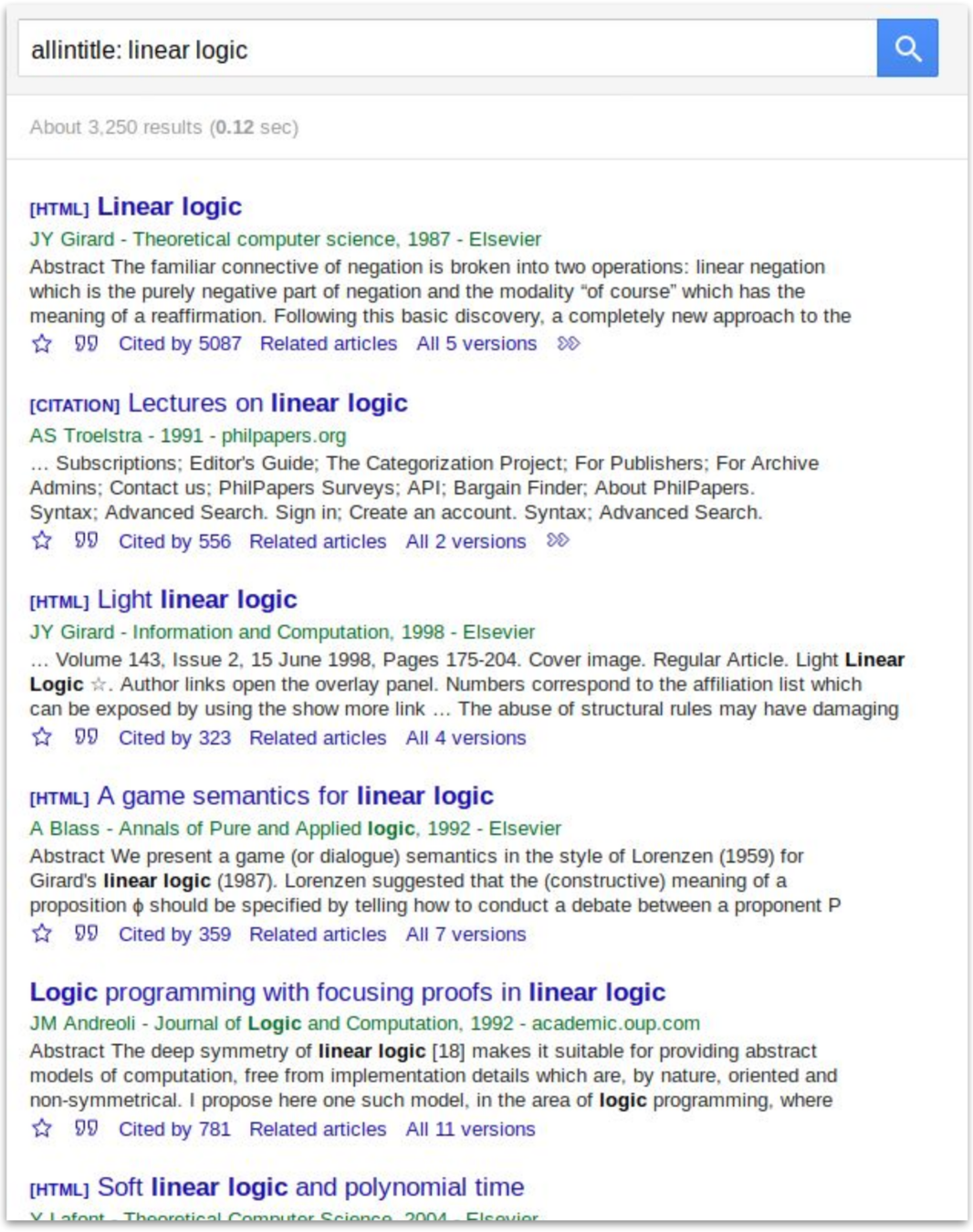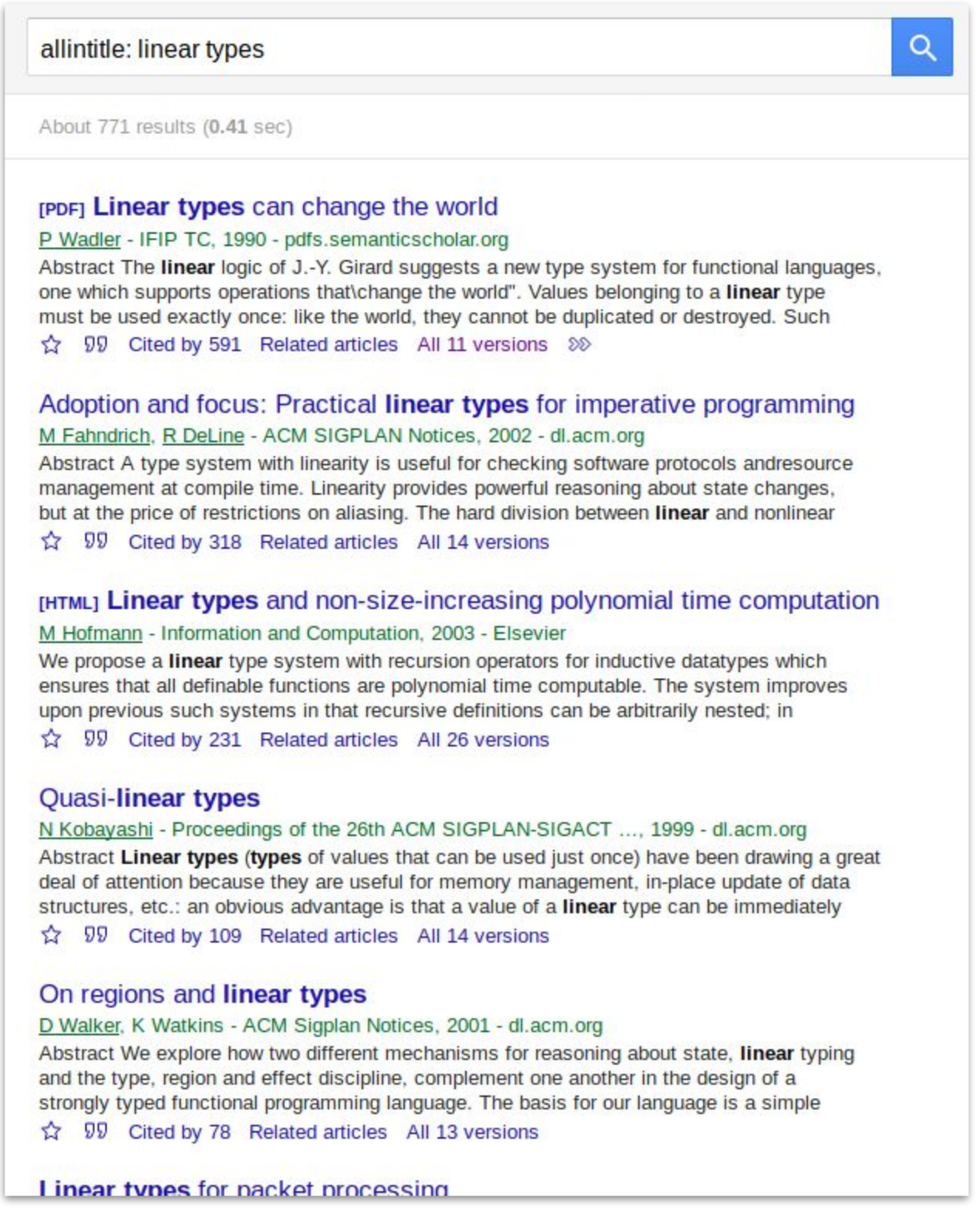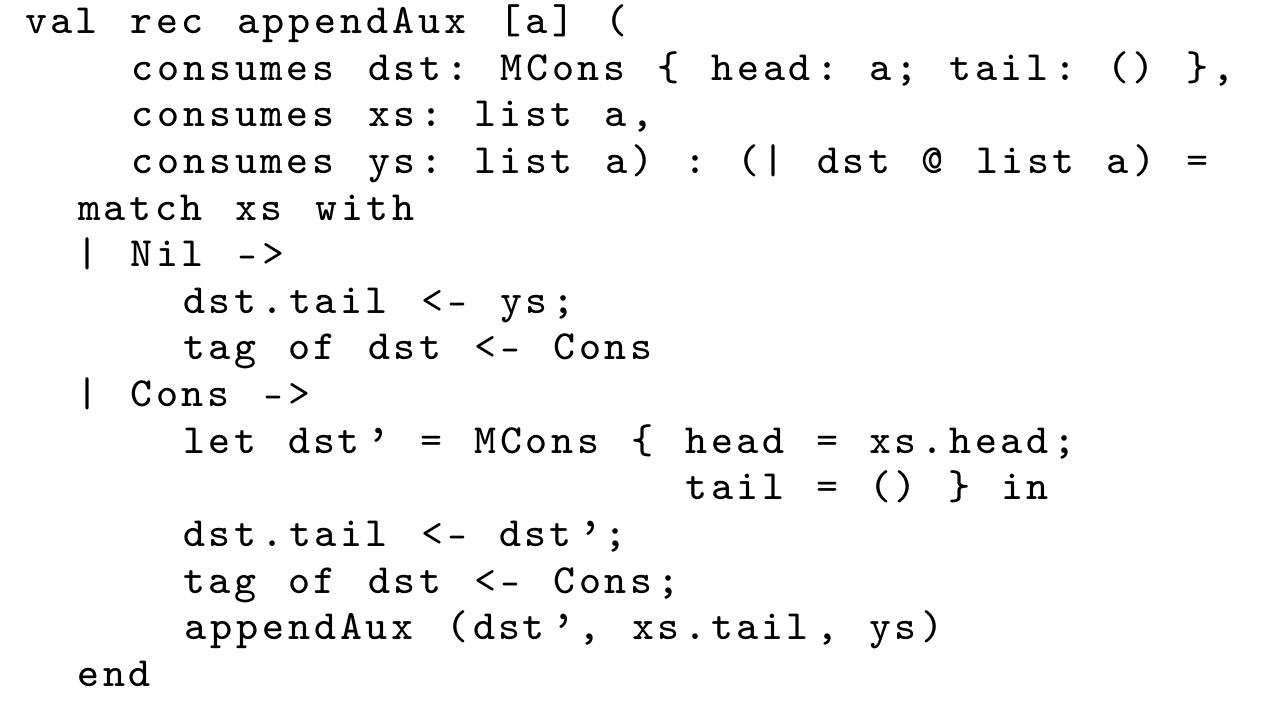Linear constraints
Arnaud Spiwack

Joint with: Jean-Philippe Bernardy, Richard Eisenberg, Csongor Kiss, Ryan Newton, Simon Peyton Jones, Nicolas Wu
Prolific literature…


… but not much delivery

That's about it
… until GHC 9.0

Linear Haskell
a ⊸ bSince GHC 9.0
{-# LANGUAGE LinearTypes #-}Completely normal Haskell + an extra type
(+ stuff for polymorphism)
(but we won't talk about it today)
Consume exactly once
f :: A ⊸ B f u uIf is consumed exactly once
then is consumed exactly once
What does “consume exactly once” mean?
evaluate x
apply x and consume the result exactly once
decompose x and consume both components exactly once
Base type
Function
Pair
The creative step
f :: A ⊸ A ⊸ !Int ⊸ B
g :: !B ⊸ C
h :: !A ⊸ C
h (!x) = g (!(f x x (!42)))f :: A -> A -> Int -> B
g :: B -> C
h :: A -> C
h x = g (f x x (42))vs
Linear types seem to require deep changes to the language
(e.g. Rust)
Linear types, by examples (1/3)
id x = x✓
linear
dup x = (x,x)✗
not linear
swap (x,y) = (y,x)✓
linear
forget x = ()✗
not linear
Linear types, by examples (2/3)
f (Left x) = x
f (Right y) = y✓
linear
✓
linear
✗
not linear
h x b = case b of
True -> x
False -> xg z = case z of
Left x -> x
Right y -> yk x b = case b of
True -> x
False -> ()✓
linear
Linear types, by examples (3/3)
f x = dup x✓
linear
✗
not linear
h u = u 0g x = id (id x)k u = u (u 0)✓
linear
✗
not linear
Application class 1
Making more things pure
Example: safe mutable arrays
Mutable arrays: the ST way
array :: Int -> [(Int,a)] -> Array a
array size pairs = runST $ do
fma <- newMArray size
forM pairs (write ma)
return (unsafeFreeze ma)newMArray :: Int -> ST s (MArray s a)
read :: MArray s a -> Int -> ST s a
write :: MArray s a -> (Int, a) -> ST s ()
unsafeFreeze :: MArray s a -> ST s (Array a)
forM :: Monad m => [a] -> (a -> m ()) -> m ()
runST :: (∀s. ST s a) -> aAllocate
Fill
Freeze
unsafeFreezeis unsafe!
The same, in Linear Haskell
array :: Int -> [(Int,a)] -> Array a
array size pairs = newMArray size $ \ma ->
freeze (foldl write ma pairs)newMArray :: Int -> (MArray a ⊸ Ur b) ⊸ Ur b
write :: MArray a ⊸ (Int,a) -> MArray a
read :: MArray a ⊸ Int -> (MArray a, Ur a)
freeze :: MArray a ⊸ Ur (Array a)
foldl :: (a ⊸ b ⊸ a) -> a ⊸ [b] ⊸ aAllocate
Fill
Freeze (safe!)
Threading style
write :: MArray a ⊸ (Int,a) -> MArray aCan't do
write ma (1, True); write ma (2, False); …Each write returns a new array
Scope passing style
newMArray :: Int -> (MArray a ⊸ Ur b) ⊸ Ur bThis is what ensures that references to arrays are unique
Unrestricted
data Ur a where
Ur :: a -> Ur acompare with
data Id a where
Id :: a ⊸ Id aData types are linear by default
Scope passing style (continued)
newMArray :: Int -> (MArray a ⊸ Ur b) ⊸ Ur bDon't work:
newMArrayDirect :: Int ⊸ MArray anewMArrayLeaky :: Int -> (MArray a ⊸ b) ⊸ bIf the result is consumed exactly once
then the argument is consumed exactly once
Remember
Application class 2
Protocols in types
Example: files
I/O protocols
Files
- ensure you close a file
- ensure no read after close
Malloc
- ensure you free a block
- ensure no read after close
Sockets
- ensure bind a socket before reading from it
- ensure you close it
- ensure you don’t read or bind after close
Files
openFile :: FilePath -> IOL Handle
readLine :: Handle ⊸ IOL (Handle, Ur String)
closeFile :: Handle ⊸ IOL ()firstLine :: FilePath -> IOL (Ur String)
firstLine fp = do
h <- openFile fp
(h, Ur xs) <- readLine h
closeFile h
return $ Ur xsMonads already have scope
do { x <- u ; v} = u >>= \x -> v(>>=) :: IOL a ⊸ (a ⊸ IOL b) ⊸ IOL bAbout the type of monads see A Tale of Two Functors or: How I learned to Stop Worrying and Love Data and Control — Arnaud Spiwack
Linear constraints
Coming back to files
openFile :: FilePath -> IOL Handle
readLine :: Handle ⊸ IOL (Handle, Ur String)
closeFile :: Handle ⊸ IOL ()firstLine :: FilePath -> IOL (Ur String)
firstLine fp = do
h <- openFile fp
(h, Ur xs) <- readLine h
closeFile h
return $ Ur xsThe same 🙁
(Inter)Mezzo

Doesn't return a new copy of ys
Constraints
show :: Show a => a -> StringA constraint
Prolog-like language
Constrained
With paramodulation
Idea: teach constraints linear logic
Files with linear constraints
openFile :: FilePath -> IOL (exists h. Ur (Handle h) <=%1 Open h)
readLine :: Open h %1=> Handle -> IOL (Ur String)
closeFile :: Open h %1=> Handle -> IOL ()firstLine :: FilePath -> IOL (Ur String)
firstLine fp = do
Pack! h <- openFile fp
Pack! xs <- readLine h
closeFile h
return $ Ur xsConstraint generation

Constraints are generated (as in GHC)
in a linear logic (new!)
C₂ to be proved under linear assumption Q₁
Constraint generation (case)

Additive conjunction
Constraint resolution
“Hereditary Harrop” fragment of Linear Logic
Reduces non-determinism to one rule
↳ add a strategy (“guess free”)
Will support current extension (“quantified constraints”)
Notion: uniform proof
↳ Originally: completeness of goal-oriented search
↳ For Linear Constraints: soundness(!!) of constraint generation
https://slides.com/aspiwack/lix202103
https://www.tweag.io/blog/tags/linear-types/
https://arxiv.org/abs/2103.06127
